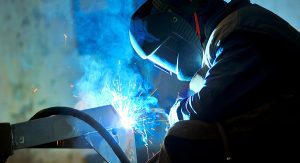Forge Your Future: Stable Careers and Skill Development in Welding
While the economy may not be stable for every career, the nation is currently facing a shortage of skilled trade workers. With the right training and skills, those who are looking for stability, competitive salaries, and the ability to advance without the need to take out a large amount of student debt, welding may be the right career path for you. It’s a reliable career with many different specialties opportunities to advance. With the right shop and skill development, you can have a rewarding and secure career in welding and fabrication.

A Secure Career From the Start
One of the greatest benefits of a career in welding is that you can begin your career quickly and easily without incurring substantial debt. All you really need to get started as a welder is a high school diploma or GED and some initial training. This initial training can be through a technical or vocational certification program and can also be done with on-the-job training. There are many benefits to going through a vocational program, including training in specific techniques. Although many employers are willing to provide training for those who show aptitude for the trade, going through a certification program at a vocational school can demonstrate your commitment to your new career. Once you’ve gone through the initial training, you can begin an apprenticeship to further develop your skills while earning. Some companies go a step further and allow you to complete all of your training in house, allowing you to earn as you learn from your first day.
Advance Your Career with New Techniques
Once you do begin your career as a welder and obtain your certifications, you can advance your career further by developing skills in advanced techniques. This can include Energy Beam Welding (EBW), Atomic Hydrogen Welding (AHW), Shielded Metal Arc Welding (SMAW), Flux-Cored Arc Welding (FCAW), and Plasma Arc Welding. Different techniques are used in different industries, and specializing in certain techniques while gaining certifications can allow you to advance your career.

Advance Through the Ranks of Your Welding Career
As you develop new skills and hone new techniques, you can advance within your fabrication shop. Many quality fabrication shops invest in their welders with a culture of mentorship and knowledge sharing within the organization. This ensures that quality remains high while the skills of the new generation of welders are refined over time. Not only does this allow skills to be preserved, but will also cultivate a sense of teamwork and camaraderie. Welders can move from their apprenticeship to welding technician, welding supervisor, welding instructor, welding inspector, and welding engineer. As welders move through these stages and develop specialized techniques, they may be given the chance to serve as project managers for different fabrication jobs. When fabrication shops invest in their employees, the reduced turnover rates will increase company loyalty.
Welders Have Options to Specialize
Many different industries need qualified and experienced welders, so there are many options as your career advances. In the construction industry, welders work on a wide range of projects, from fabricating structural steel components to building bridges and skyscrapers. Welders in manufacturing facilities assemble the components used in machinery, appliances, and vehicles. Those who work in manufacturing usually develop advanced welding skills as they work with new technology and automation systems. Welders who show exceptional aptitude in precision and attention to detail may find work in the aerospace industry, working with lightweight materials including titanium and aluminum as they work on aircraft components.
On the other end of the spectrum, shipbuilding requires welders to work with heavy-duty materials. These welders need to develop specialized techniques in underwater welding and work on ships, oil rigs, and offshore platforms. Welders who are skilled at adhering to strict quality standards can find work in the automotive industry, where they work on the fabrication and repair of vehicle components. Once you begin your career as a welder, you can see where your natural capabilities lie and direct your career toward your interests.
What Skills Do Welders Need to Advance?
A leading fabrication shop will ensure that you have the right skills to advance in your career. This includes not only the technical skills, but physical skills to meet the demands of the job. While these technical and physical skills are important, they aren’t the only skills needed to advance in your welding career. More important for advancements are the additional attributes such as attention to safety, adaptability, and the desire to want to learn and advance. Welding is a field that is constantly evolving, and a commitment to lifelong learning of new industry trends and advancements will make a big difference in your career trajectory. Many fabrication shops invest in professional development opportunities for employees who have the right aptitude and dedication to advance. With a state-of-the-art fabrication shop like Swanton Welding mentoring a welder’s career, the culture of continuous learning will drive lasting success.
When you are ready to forge your future and begin a career in the skilled trades, choosing welding as your pathway can set you up for success. With a fabrication shop that values on-the-job training, mentorship, continuous learning, and promoting from within, you will build a long and rewarding career as a welder. Become part of a team that will help shape the future of the industry by contacting Swanton Welding today.
